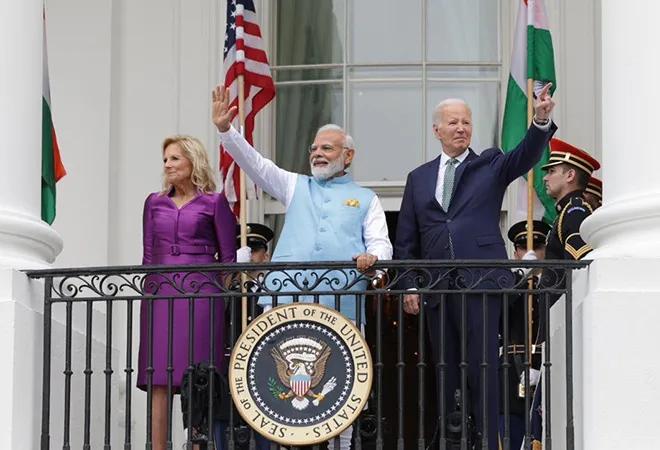-
CENTRES
Progammes & Centres
Location
As the G20 president, India has been striving for a more equitable and inclusive G20 that incorporates the voices from the AU

The African Union (AU) has been a permanent guest for a series of G20 summits and are leading specific working groups such as the African Union Economic Program and the New Partnership for Africa’s Development (NEPAD) at the G20. Currently, it has only a marginal representation at the G20 with one permanent member and two guest seats at the table. In contrast, the European bloc currently represents six permanent seats and one guest representation, which is significantly more than the comparatively newly designed counterpart union, the AU. With an economic size of 10 percent of the global economy, 1.4 billion African people and a demographic dividend with a median age of 19 years, the AU is similar to the European Union (EU) on these parameters. On paper, the permanent membership of the AU makes a strong case for itself, with currently 55 member countries of the continent, that are projected to have the largest population by 2050.
The European bloc currently represents six permanent seats and one guest representation, which is significantly more than the comparatively newly designed counterpart union, the AU.
As the preparations for the G20 Summit 2023 in New Delhi are underway, it is an opportunity for India to also showcase its leadership representing the Global South. Among the G20 member countries, four out of six countries of the Global South will hold the Presidency of the G20 in two consecutive troikas: ‘Indonesia-India-Brazil’ and ‘India-Brazil-South Africa’. This crucial juncture of the ‘Global South Quad’ allows the G20 leadership to empower perspectives from the Global South by making recommendations for significant structural reforms. During the last G20 Presidency, Indonesia already endorsed the idea of a permanent seat for the AU before the G20 Bali Summit in 2022. This initiative was then backed by other G20 members like France, China, and South Africa, but later, Bali’s Leadership Declaration 2022 parted with this initiative. Other summits have also called upon global institutions for better representations like the United States (US)-Africa Leadership Summit 2022 in Washington DC – where US President Joe Biden has supported the AU joining the G20 as a permanent member.
The G20 is often criticised by the external countries as a ‘private grouping’ that lacks a roadmap for new membership. To counter such narratives, a “human-centric” approach is possible, as suggested by Indian Prime Minister Narendra Modi, referring to the G20’s existing partnership in the areas of vaccine or pharmaceutical supply chain during a major conflict, a pandemic, or a global economic crisis. The Global South consultations gained unprecedented leverage through the “Voice of Global South Summit”, an initiative under the Indian G20 Presidency, which prioritises sustainable and inclusive global growth. By engaging in such initiatives, the G20 can develop a roadmap to enhance the capabilities of the old Bretton Woods institutions enabling them to address contemporary challenges that go beyond economic integration.
The Global South consultations gained unprecedented leverage through the “Voice of Global South Summit”, an initiative under the Indian G20 Presidency, which prioritises sustainable and inclusive global growth.
With this potential proposal, the G20 policymakers should also be cautious of the geopolitical polarisation of the young AU . China has significantly shown interest in dominating the region, either by unilaterally funding the AU headquarters in Ethiopia or by claims of cyber espionage in the AU workplace. Can the AU maintain its strategic neutrality while driving its development agenda at the G20 plurilateral arena? Despite this geopolitical polarisation of the AU and of G20 members towards many other development challenges, Can India lead the Global South by taking a responsible macro view of global challenges?
The annual AU summit earlier this year in January 2023 reinstated the African Vision for 2063 and highlighted a range of outcomes from the African Continental Free Trade Agreement, appropriate governance structure to negotiate as a union, capacity building, and non-traditional security challenges of food security, energy security, et al. However, the G20 policy-makers may argue that the AU bloc currently may not serve as a rigorous and efficient system like that of the complimenting EU bloc, still, with the AU potential, the region should be integrated in the decision-making process of the G20. The AU agenda strongly aligns with many task force workings like the ‘G20 Action Plan on the 2030 Agenda for Sustainable Development in 2016’, led by the G20 Development Working Group. Such inter-governmental groupings will provide the African bloc with improved economic bargaining power on the global stage after their permanent presence at the negotiating table and at least convey a minimum common denominator of economic requirements for a fragmented and diverse union. Can other AU Summits integrate with the G20 agenda by holding meetings on the sidelines regularly? Can this agenda align with other AU bilateral annual forums like the TICAD, Russia-Africa, Europe-Africa, or the India-Africa Summits?
The AU agenda strongly aligns with many task force workings like the ‘G20 Action Plan on the 2030 Agenda for Sustainable Development in 2016’, led by the G20 Development Working Group.
The two-decade-old AU may lack geopolitical assimilation between its member countries, which may be a cause of worry for integration with the G20 members. In addition, structural interventions are a challenging task and thus, the extension of the G20 membership could be a time-consuming exercise involving multiple rounds of negotiations. Are there some alternate interventions possible for the Global South to be included in the G20? There seems to be a lack of accounting of the Global South’s issues, especially for the non-traditional security challenges during a global crisis. Can a parallel ‘Binding and Formal Participation’ be designed to tackle non-traditional security issues, especially for critical supplies during an emergency? A specialised trade dispute resolution mechanism under the ambit of G20, in coordination with the existing WTO norms for dealing during a global crisis like a pandemic, can be an alternative for the inclusion of Global South voices. This G20 trade dispute resolution mechanism can enable the Global South to access critical economic solutions as they are the most vulnerable during a crisis.
India has invited several global institutions including the UN, World Bank, and International Monetary Fund (IMF) to the G20 Delhi Summit in September 2023, crafting it as a grand stage for a Global South intervention. However, there are still questions that remain unanswered in terms of the legitimate integration of the AUitself. Unlike the EU, the AU currently does not have a common currency, a customs’ union, or regional peace, and security, for comprehensive economic integration with plurilateral G20 formation. The African Union Summit 2024 can include structural discussions among its member countries to determine the norms of formal negotiations among themselves for a G20 plurilateral forum. As there is a long way ahead for AU to get structural recognition under the G20 umbrella, these four years of the ‘Global South Quad’ of G20 presidencies can serve as the foundational years to negotiate with the rest of the member countries. In conclusion, if this inclusion of the AU proceeds in the plurilateral arena of the G20, it will be a paradigm shift in the perceived notion towards Africa by the developed and developing economies of the world.
Sagar K. Chourasia, Associate Fellow, Centre for Economy, and Growth at ORF
The views expressed above belong to the author(s). ORF research and analyses now available on Telegram! Click here to access our curated content — blogs, longforms and interviews.

Sagar K. Chourasia, was an Associate Fellow at the Centre for Economy and Growth at ORF and will be working as a G20 Leaders’ Fellow ...
Read More +